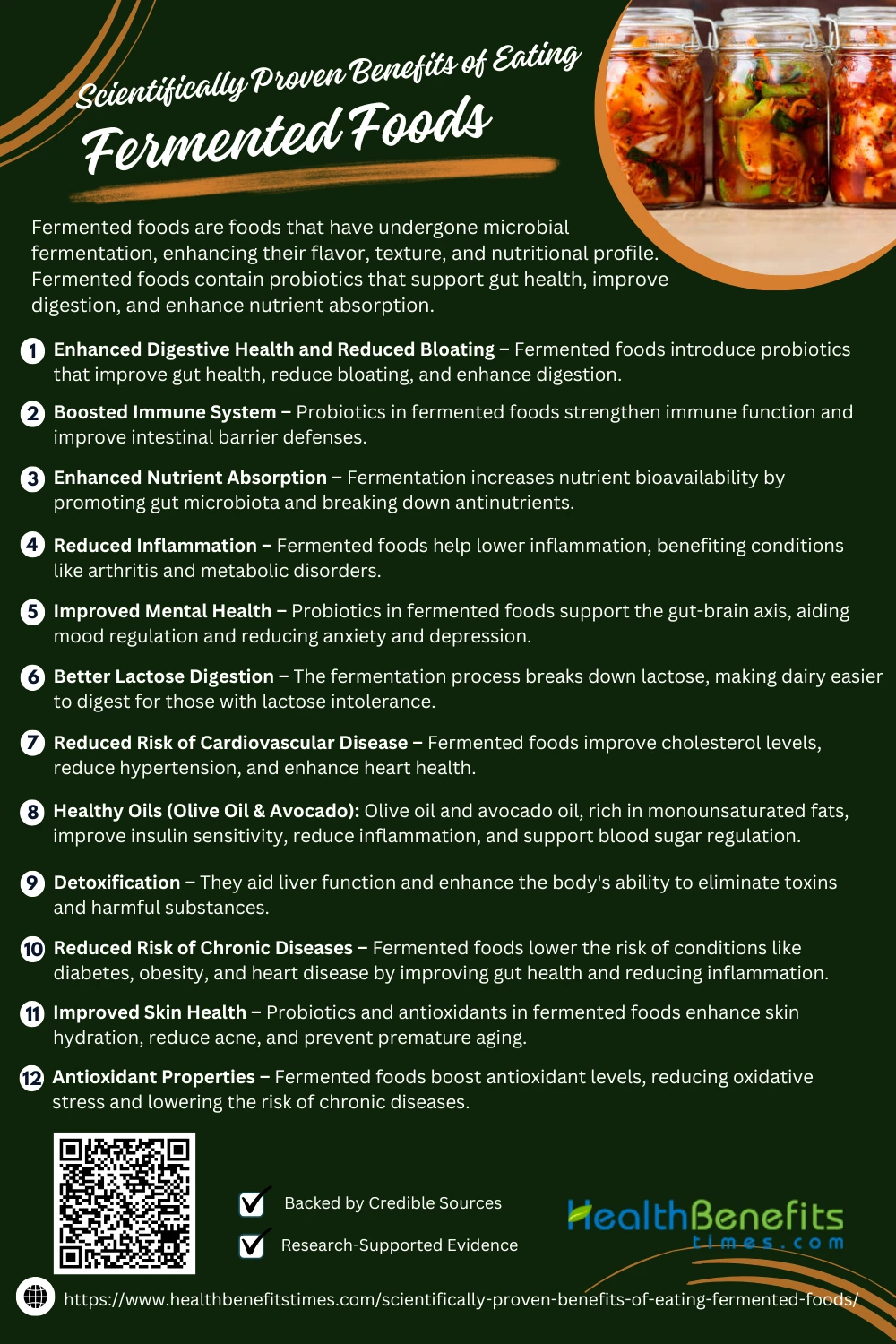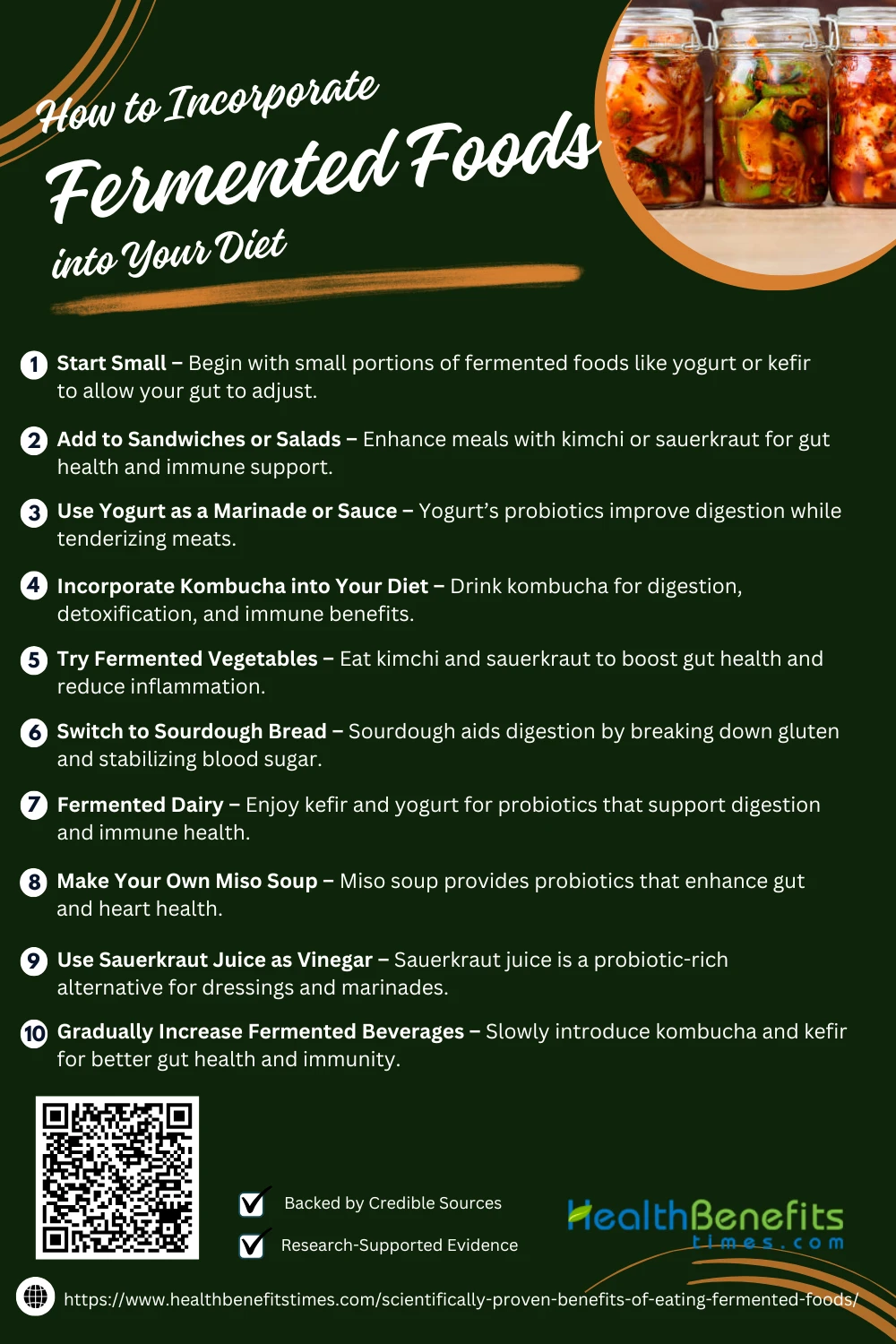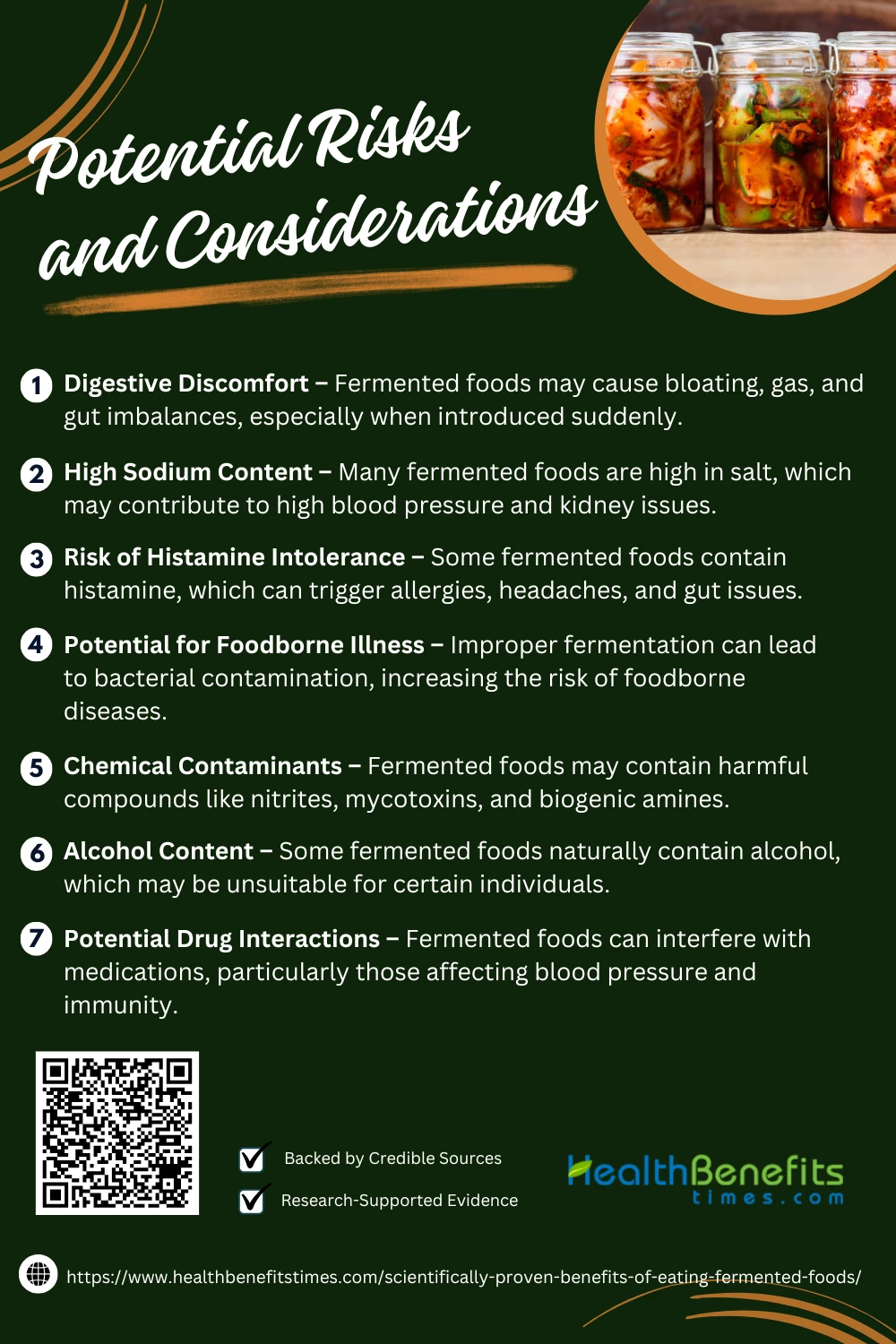- Fermented foods are foods that have undergone microbial fermentation, enhancing their flavor, texture, and nutritional profile.
- Fermented foods contain probiotics that support gut health, improve digestion, and enhance nutrient absorption.
- Scientific research links fermented foods to a stronger immune system, reduced inflammation, and potential benefits for mental health and metabolism.
 Fermented foods are foods that have undergone a metabolic process in which microorganisms such as bacteria, yeasts, or molds break down carbohydrates (e.g., sugars and starches) in the absence of oxygen. This process can enhance the nutritional profile, digestibility, and flavor of the food. Fermented foods have long been an integral part of human diets due to their rich history and numerous health benefits. Scientific research has increasingly recognized the positive effects of these foods on gut health, with the consumption of fermented foods supporting the balance of beneficial gut microbiota. For instance, probiotics found in fermented foods like yogurt, kimchi, and sauerkraut can aid in the improvement of gut microbiota composition, promoting better digestion and absorption of nutrients. The regular consumption of fermented foods has been shown to help in preventing gastrointestinal disorders, including irritable bowel syndrome (IBS). Moreover, these foods contribute to enhanced immune system function by modulating gut-associated lymphoid tissue.
Fermented foods are foods that have undergone a metabolic process in which microorganisms such as bacteria, yeasts, or molds break down carbohydrates (e.g., sugars and starches) in the absence of oxygen. This process can enhance the nutritional profile, digestibility, and flavor of the food. Fermented foods have long been an integral part of human diets due to their rich history and numerous health benefits. Scientific research has increasingly recognized the positive effects of these foods on gut health, with the consumption of fermented foods supporting the balance of beneficial gut microbiota. For instance, probiotics found in fermented foods like yogurt, kimchi, and sauerkraut can aid in the improvement of gut microbiota composition, promoting better digestion and absorption of nutrients. The regular consumption of fermented foods has been shown to help in preventing gastrointestinal disorders, including irritable bowel syndrome (IBS). Moreover, these foods contribute to enhanced immune system function by modulating gut-associated lymphoid tissue.
Additionally, fermented foods are rich in bioactive compounds that have been linked to improved cardiovascular health. The regular intake of fermented foods may also reduce the risk of type 2 diabetes through the enhancement of insulin sensitivity and regulation of blood glucose levels. These foods may also help lower inflammation and support the microbiome, leading to a decrease in chronic inflammation which has been associated with various diseases. Furthermore, fermented foods are a great source of essential vitamins, including B vitamins, which are vital for energy metabolism, and vitamin K2, which supports bone health. Lastly, emerging studies suggest that the fermentation process can increase the bioavailability of certain minerals, such as calcium and magnesium, further contributing to improved bone and muscle health. Thus, fermented foods are not only beneficial for digestive and immune health but can also provide a wide range of systemic health benefits, making them an important part of a balanced diet.
What Are Fermented Foods?
Fermented foods are produced through controlled microbial growth and enzymatic action, where microorganisms like bacteria or yeast break down the food components, typically carbohydrates, into simpler compounds like lactic acid. This process enhances food preservation and flavor while introducing beneficial probiotics. Common examples include yogurt, kefir, sauerkraut, kimchi, and fermented soy products like tempeh. These foods are rich in probiotics, particularly Lactobacillus and Bifidobacterium, which promote gut health and immune function. Research has shown that regular consumption of fermented foods can support digestive health and improve microbiome diversity
Scientifically Proven Benefits of Eating Fermented Foods
Fermented foods, rich in probiotics, improve gut health, enhance digestion, boost immunity, support mental well-being, promote nutrient absorption, aid weight management, improve skin health, and potentially reduce the risk of chronic diseases.
1. Enhanced Digestive Health and Reduced Bloating
Fermented foods have shown to significantly improve digestive health by introducing beneficial probiotics into the gut microbiota, which can lead to a reduction in bloating and better overall gut function. According to a study published in Frontiers in Microbiology link, probiotics help maintain the gut’s microbial balance. Additionally, research indicates that consuming fermented foods like kimchi and yogurt may alleviate bloating symptoms. (1) Studies support the role of fermented foods in enhancing gut permeability, (2) thus contributing to gut health. Furthermore, a systematic review suggests probiotics can provide effective treatment for bloating in patients with IBS. (3)
2. Boosted Immune System
Consuming fermented foods has been linked to a stronger immune system, as they are rich in probiotics that help regulate immune function. Research indicates that regular intake of fermented foods such as kefir and sauerkraut boosts immune responses by enhancing gut-associated lymphoid tissue (GALT). (4) Studies also show that fermented food consumption contributes to the production of immune-enhancing molecules like short-chain fatty acids. (5) Furthermore, probiotic-rich foods improve the intestinal barrier function, preventing pathogen invasion. (6) A study highlights that fermentation improves nutrient bioavailability, enhancing immune health link. (7)
3. Enhanced Nutrient Absorption
Fermented foods, rich in probiotics, have been linked to enhanced nutrient absorption in the body. Studies indicate that these foods support the growth of beneficial gut microbiota, leading to improved digestion and greater bioavailability of essential nutrients like vitamins and minerals. For instance, research has shown that fermented dairy can enhance calcium absorption, while fermented vegetables aid in the bioavailability of antioxidants. (8) Moreover, certain fermentation processes break down antinutrients, making minerals like iron more accessible. (9) This ability to improve nutrient absorption makes fermented foods an important part of a balanced diet. (10) Similarly, consuming fermented foods like kimchi and sauerkraut supports the breakdown of compounds that otherwise inhibit nutrient uptake. (11) The incorporation of fermented foods into everyday meals has profound benefits for nutrient bioavailability and overall gut health. (12)
4. Reduced Inflammation
Research suggests that consuming fermented foods can significantly reduce inflammation in the body, offering benefits for conditions such as arthritis and gastrointestinal disorders. Studies indicate that probiotics in fermented foods can modulate immune responses, leading to a decrease in inflammatory markers. For example, a study found that fermented dairy products can help reduce markers of inflammation in individuals with metabolic syndrome. (13) Similarly, fermented vegetables have been shown to promote anti-inflammatory effects by enhancing gut microbiota balance. (14) Additionally, fermented foods like kefir and kombucha have been linked to reduced inflammatory responses in animal studies. (15) This anti-inflammatory action is also thought to be due to the production of bioactive compounds during fermentation. (16) Integrating fermented foods into the diet may serve as a natural strategy for mitigating chronic inflammation. (17)
5. Improved Mental Health
Research suggests that fermented foods play a role in enhancing mental health by promoting the gut-brain axis. Fermented foods, like kimchi, sauerkraut, and yogurt, contain probiotics that are beneficial for gut health and can influence mood regulation. Studies have shown that probiotics, such as those found in fermented foods, can help reduce symptoms of anxiety and depression by improving gut microbiota diversity and enhancing neurotransmitter function. (18) Furthermore, fermented foods have been linked to reduced inflammation, a factor contributing to mental disorders. (19) Other studies demonstrate their effect on cognitive function, indicating a relationship between gut health and mental clarity. (20)
6. Better Lactose Digestion
Fermented foods, such as yogurt, kefir, and cheese, offer significant advantages for those with lactose intolerance. The fermentation process breaks down lactose into simpler sugars, which can be more easily digested. A study showed that regular consumption of fermented dairy products reduces the symptoms of lactose intolerance. (21) This is because live probiotics in fermented foods aid the digestion of lactose by producing lactase, the enzyme responsible for breaking down lactose. (22) Additionally, research indicates that fermented foods can promote gut health and alleviate discomfort related to lactose intolerance, with studies suggesting an improvement in gut microbiota diversity (Stanton et al., 2019). (23)
7. Reduced Risk of Cardiovascular Disease
Research has shown that consuming fermented foods can significantly reduce the risk of cardiovascular disease (CVD). Fermented foods such as yogurt, kefir, and kimchi are rich in probiotics, which improve gut health and reduce inflammation, both crucial for heart health. (24) Studies have linked the intake of fermented dairy to improved cholesterol levels and reduced hypertension. (25) Additionally, fermented foods contribute to better lipid profiles and lower arterial stiffness. (26) Other research suggests that fermented plant-based foods, such as miso, also play a protective role against CVD. (27) Overall, a fermented food-rich diet can be an effective tool in the prevention of cardiovascular diseases.
8. Weight Management
Fermented foods, like kefir and kimchi, have been associated with weight management through their ability to improve gut microbiota. Studies indicate that probiotics found in fermented foods may enhance metabolic function, leading to weight loss and improved fat distribution. (28) Fermented foods have also been shown to regulate appetite by influencing hunger-related hormones. (29) Research suggests that consuming fermented dairy products like yogurt reduces body fat accumulation. (30) Additionally, the intake of fermented foods can increase energy expenditure, which contributes to weight loss. (31) Overall, the consumption of fermented foods is a promising strategy for managing body weight effectively.
9. Detoxification
Fermented foods play a vital role in detoxifying the body by enhancing liver function and facilitating the elimination of toxins. The fermentation process increases the bioavailability of nutrients, aiding in the absorption of antioxidants that combat oxidative stress. A study suggests that consuming fermented foods can aid in the removal of heavy metals, while another research on gut detoxification shows their role in gut health. (32) (33) Moreover, fermented foods are shown to improve liver detoxification pathways, as highlighted in this clinical trial, which discusses the gut-liver axis. Fermented soy also has detoxifying properties, particularly in neutralizing harmful substances. (34) (35) Incorporating these foods can, therefore, support the body in its natural detoxification processes.
10. Reduced Risk of Chronic Diseases
Fermented foods, such as yogurt, kimchi, and sauerkraut, have been linked to a reduced risk of chronic diseases like cardiovascular disease, diabetes, and obesity. Studies suggest that the probiotics present in these foods help improve gut health, which in turn can enhance immune function and decrease inflammation, important factors in the prevention of chronic illnesses. For example, a study on fermented foods and chronic diseases highlights their potential in reducing blood pressure, while research on gut microbiota further supports the health benefits. (36) (37) Additionally, fermented foods like kimchi have been shown to have a positive effect on cholesterol levels, reducing the risk of cardiovascular disease. Furthermore, they may aid in weight management, as shown by this research. (38) (39) These findings underline the significance of incorporating fermented foods into the diet for long-term health benefits.
11. Improved Skin Health
Fermented foods are widely recognized for their potential to improve skin health through their beneficial bacteria and antioxidants. Studies suggest that regular consumption of fermented products, like kimchi and sauerkraut, can significantly enhance skin hydration and reduce inflammation. These foods promote a balanced gut microbiota, which is directly linked to healthier skin. (40) Moreover, the probiotic-rich foods can aid in managing acne and eczema, leading to clearer skin source. (41) Consuming fermented foods can also provide a boost to collagen synthesis, resulting in more youthful skin. (42) Additionally, antioxidants present in fermented foods help fight oxidative stress, preventing premature aging. (43) Together, these factors combine to support the overall health and appearance of the skin.
12. Antioxidant Properties
Fermented foods, such as kefir, kombucha, and miso, are rich in antioxidants that play a crucial role in reducing oxidative stress and inflammation. These properties help protect cells from damage, contributing to better overall health. Research indicates that fermented foods improve antioxidant levels in the body by promoting the production of compounds such as polyphenols and flavonoids. (44) Studies have also shown that the fermentation process increases the bioavailability of these antioxidants, making them more effective. (45) Regular consumption of fermented foods is linked to improved gut health, which further aids in the absorption of antioxidants. (46) These antioxidant-rich foods are thus a powerful tool for combating diseases associated with oxidative damage, including cardiovascular diseases and neurodegenerative disorders. (47) Fermented foods represent an accessible and effective way to boost antioxidant intake and improve health outcomes.
How to Incorporate Fermented Foods into Your Diet
Fermented foods are packed with probiotics that support gut health and overall wellness. Incorporating them into your diet can be easy and delicious. Here’s how to get started with simple steps!
1. Start Small
To start incorporating fermented foods into your diet, it’s best to introduce them gradually to allow your digestive system to adjust. Start with small portions of fermented options like yogurt or kefir. Research has shown that fermented foods are rich in probiotics, which can enhance gut health and improve digestion. (48) It’s important to gradually increase the quantity to avoid digestive discomfort. (49)
2. Add to Sandwiches or Salads
Adding fermented foods like kimchi or sauerkraut to sandwiches and salads is an easy way to enjoy their benefits. These foods provide beneficial bacteria that may improve gut flora balance and digestion. Studies suggest that they are also linked to enhancing immune function and reducing inflammation. (50) (51)
3. Use Yogurt as a Marinade or Sauce
Yogurt is an excellent choice for a marinade or sauce, as its natural probiotics and lactic acid enhance the flavor and tenderness of meats. Research indicates that yogurt’s probiotic content supports digestion and immune function and can improve gut health. (50) (48)
4. Incorporate Kombucha into Your Diet
Incorporating kombucha into your diet is simple and effective for boosting gut health. Kombucha contains beneficial bacteria and acids that can enhance digestion and detoxification processes. Studies have shown kombucha’s positive effects on immune system modulation and its antioxidant properties. (49) (51)
5. Try Fermented Vegetables
Fermented vegetables like kimchi and sauerkraut are rich in probiotics that promote gut health and digestion. Studies show that these foods support immune function and reduce inflammation. (50) Additionally, they enhance nutrient absorption and improve microbiome diversity. (48)
6. Switch to Sourdough Bread
Switching to sourdough bread can improve digestion due to its natural fermentation process, which breaks down gluten and phytic acid. Research highlights its role in stabilizing blood sugar levels and supporting gut health through beneficial bacteria. (49) (51)
7. Fermented Dairy
Fermented dairy products like kefir and yogurt are excellent sources of probiotics, which support gut health and digestion. Studies suggest they can enhance immune function and reduce inflammation. (50) Additionally, they provide beneficial bacteria that aid in lactose digestion. (48)
8. Make Your Own Miso Soup
Making miso soup at home is an easy way to enjoy the probiotic benefits of fermented soybeans. Research shows that miso consumption may improve gut microbiota balance and support heart health by reducing blood pressure. (49) (51)
9. Use Sauerkraut Juice as Vinegar
Sauerkraut juice can be a probiotic-rich alternative to vinegar in dressings and marinades. Studies suggest it supports gut health and enhances digestion due to its high content of lactic acid bacteria. (50) Additionally, it may help reduce inflammation and improve nutrient absorption. (48)
10. Gradually Increase Fermented Beverages
Introducing fermented beverages like kombucha and kefir gradually allows your digestive system to adjust to their probiotic content. Research shows they help improve gut microbiota balance and support immune function by promoting beneficial bacteria. (49) (51)
Potential Risks and Considerations
While fermented foods offer numerous health benefits, they may not be suitable for everyone. It’s important to understand potential risks and considerations before incorporating them into your diet for optimal safety.
1. Digestive Discomfort
Fermented foods can cause digestive discomfort, including bloating and gas, due to their high probiotic and fiber content. Studies suggest that individuals new to these foods may experience temporary gut imbalances. (52) Additionally, excessive intake may lead to an overgrowth of gut bacteria, causing symptoms like diarrhea and cramping. (50)
2. High Sodium Content
Many fermented foods, including pickles and kimchi, contain high levels of sodium, which can contribute to high blood pressure and cardiovascular diseases. Studies indicate that excessive sodium intake increases the risk of hypertension. (50) Additionally, frequent consumption of salty fermented foods may negatively impact kidney function. (48)
3. Risk of Histamine Intolerance
Fermented foods like aged cheeses, kimchi, and kombucha are high in histamine, which can trigger allergic reactions in sensitive individuals. Research suggests that histamine intolerance may cause headaches, skin rashes, and digestive issues. (49) Furthermore, consuming excessive histamine-rich foods can lead to inflammation and gut imbalances. (51)
4. Potential for Foodborne Illness
Improper fermentation conditions can lead to foodborne illnesses due to harmful bacterial contamination. Research highlights that botulism and pathogenic bacteria may develop if fermentation lacks the proper pH and salt balance. (50) Additionally, fermentation failures can result in the presence of dangerous microbes like E. coli and Salmonella. (53)
5. Chemical Contaminants
Fermented foods can contain chemical contaminants like nitrites, which may form carcinogenic compounds when combined with proteins. Studies indicate that mycotoxins from fungi in improperly stored fermented foods can pose significant health risks. (49) Furthermore, exposure to biogenic amines in fermented products can lead to adverse neurological effects. (51)
6. Alcohol Content
Some fermented foods and beverages, such as kombucha and kefir, contain small amounts of alcohol due to natural fermentation. Studies indicate that even minimal alcohol levels may be unsuitable for individuals with alcohol sensitivities or restrictions. (50) Additionally, consuming fermented beverages in excess may contribute to unintended alcohol intake. (49)
7. Potential Drug Interactions
Fermented foods can interact with medications, particularly those affecting blood pressure and the immune system. Research suggests that high tyramine levels in fermented foods can interfere with monoamine oxidase inhibitors (MAOIs), causing dangerous spikes in blood pressure. (48) Furthermore, probiotics in fermented foods may alter the effectiveness of immunosuppressive drugs. (51)
Conclusion
Incorporating fermented foods into your diet can significantly enhance gut health, boost immunity, and improve digestion, all backed by scientific research. Their rich probiotic content supports a balanced microbiome, which plays a crucial role in overall well-being. Additionally, fermented foods may aid in nutrient absorption, reduce inflammation, and contribute to mental health. While individual responses may vary, the benefits of these foods are well-documented, making them a valuable addition to a healthy lifestyle. By enjoying a variety of fermented foods, you can harness their nutritional power and support long-term health.





